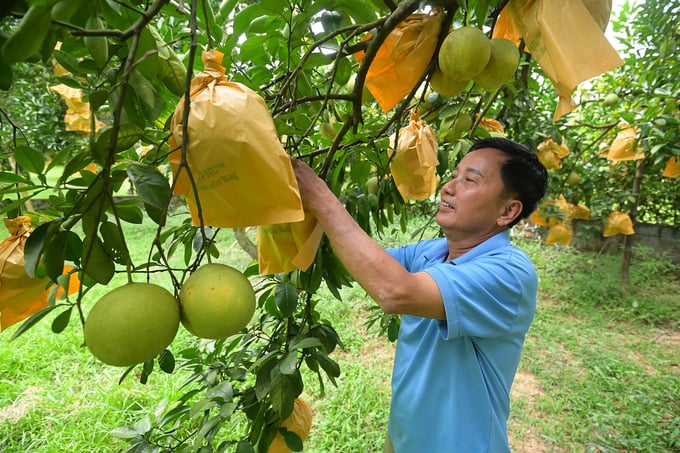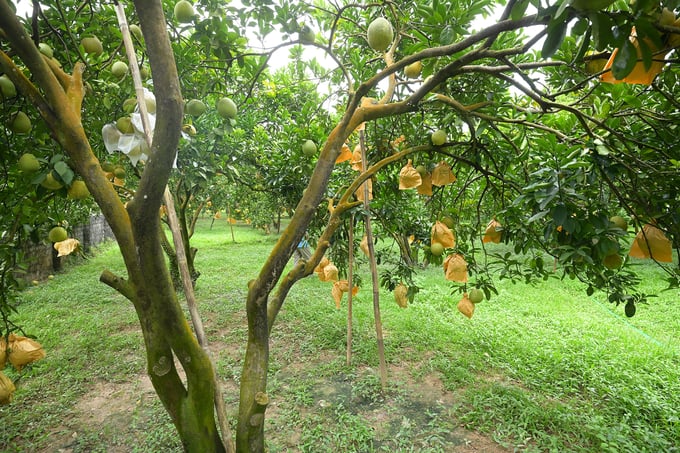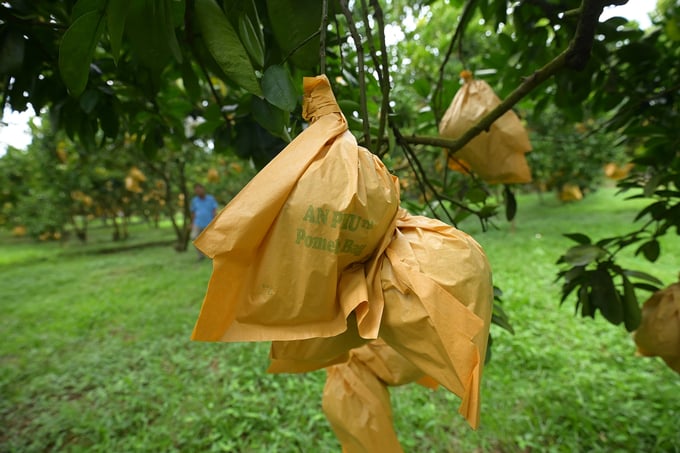November 20, 2025 | 17:59 GMT +7
November 20, 2025 | 17:59 GMT +7
Hotline: 0913.378.918
November 20, 2025 | 17:59 GMT +7
Hotline: 0913.378.918

Duong Tat Tinh tending to his red pomelo farm in preparation for export to the UK. Photo: Tung Dinh.
Duong Tat Tinh, a 70-year-old pomelo farmer, maintains a sharp, agile, and healthy look, despite his age. Moving through his red pomelo farm, Tinh recalls, "During its peak, the price for each Tan Lac red pomelo ranged from 30,000 to 35,000 VND; however, the current highest price only reaches roughly 5,000 VND per fruit."
The peak season Tinh refers to occurred between 2016 and 2018, when Tan Lac red pomelos gained widespread popularity and became a market sensation. However, shortly afterward, the uncontrolled propagation and excessive propagation of pomelos led to market saturation, causing a significant decline in prices.
As prices dropped and the costs of labor and materials rose, pomelo farmers in Tan Lac District (Hoa Binh Province) allowed their trees to grow untended, harvesting and selling whatever fruit remained at the end of the crop cycle. Consequently, the prices fell to as low as 2,000 VND per fruit. In response to these challenges, many farmers opted to cut down their pomelo trees and convert to other crops.
At 70 years of age, Duong Tat Tinh remains remarkably sharp, agile, and in good health. Upon meeting him, many would assume he is only in his early 60s. Moving swiftly through his red pomelo orchard, Mr. Tinh reflects, "At its peak, each Tan Lac red pomelo sold for between 30,000 to 35,000 VND, whereas now the price has dropped to around 5,000 VND per fruit."
The peak period he refers to occurred between 2016 and 2018, when Tan Lac red pomelos gained widespread popularity and were highly sought after in the market. However, soon after, the uncontrolled propagation and excessive planting of pomelos led to market saturation, causing a significant decline in prices.
As prices dropped and the costs of labor and materials rose, many pomelo growers in Tan Lac (Hoa Binh) allowed their trees to grow untended, harvesting and selling whatever fruit remained at the end of the season, with prices sometimes falling as low as 2,000 VND per fruit. Faced with these challenges, many farmers opted to cut down their pomelo trees and switch to other crops, deeming further cultivation unprofitable.
Tinh, however, remained determined and committed to his pomelo farm. His family has a strong history of pomelo cultivation since 2004. During the fruit's prime years, each tree generated up to 15 million VND in revenue. Notably, their modest 0.5-hectare farm yielded between 500 and 600 million VND annually.

Tinh's red pomelo farm continues to produce high value as a result of his focus on GlobalGAP-compliant cultivation practices. Photo: Tung Dinh.
After identifying indications of market saturation, Tinh decided to implement a change, beginning with the establishment of a cooperative group. His red pomelo cooperative group in Tan Huong Hamlet, Thanh Hoi Commune, Tan Lac District, currently consists of 12 members, covering nearly 17 hectares.
"After forming the cooperative group, we requested guidance from the district's Agriculture and Rural Development Office on how to cultivate clean pomelos, with the aim of improving quality and acquiring labels for distribution to supermarkets and clean food stores," Tinh shared.
By 2018, the cooperative group’s production area, under Tinh’s leadership, had received VietGAP certification. The cooperative group achieved GlobalGAP status four years later. These achievements allowed the cooperative group to meet the strict standards of various global markets, marking a new direction and restoring the prestige of Tan Lac's red pomelo.
In addition to obtaining GlobalGAP certification in 2022, Tinh's cooperative group also established its production unit code in the same year. "After we began applying for a production unit code, officials from the district's Agriculture and Rural Development Office, the provincial Department of Crop Production and Plant Protection, and the Department of Plant Protection frequently visited the farm to provide instructions and supervise our production process to ensure compliance with standards," Tinh explained.
Under Tinh's leadership, his cooperative group received a production unit code that grants its red pomelos access to Europe, the United States, and New Zealand. Further reviews are currently underway for export to South Korea and Australia, with Japan potentially opening its market in the near future.
The volume of red pomelo exports to Europe, specifically the UK, has maintained a steady increase since 2022. "We started with 5 tons in 2022, which increased to 10 tons in 2023, and this year, we expect to export 30 tons," Tinh shared optimistically.
With the aim of streamlining operations, Tinh is currently working to upgrade the cooperative group into an official cooperative. This new legal status will allow the group to conduct business more systematically.

Farmers wrap pomelos to protect against harmful organisms. Photo: Tung Dinh.
Regarding export markets, Tinh noted that despite the similarities in pesticide usage and cultivation processes between different countries, the post-harvest treatment requirements typically differ.
For instance, the United States sets requirements regarding an irradiation process, whereas Europe and New Zealand require a freezing process. In contrast, South Korea and Japan (in the near future) require hot water treatment at 47°C to eliminate pests.
Although Tinh and the cooperative group's members have adhered to cultivation and pesticide residue control standards, they expect specialized agencies to establish recognized irradiation and hot water treatment facilities in northern Vietnam in the near future.
"If these facilities are available in the North, our costs will decrease significantly, resulting in better benefits for red pomelo farmers in Tan Lac," added Tinh, who currently manages a 4-hectare pomelo farm.
Translated by Nguyen Hai Long

(VAN) A surge in Ukrainian egg exports, largely driven by soaring sales to the UK over the last few years, has notably pushed up egg prices on the domestic market.

(VAN) The price of Arabica Catimor coffee in Quang Tri is currently at VND 25,000–27,000/kg (fresh cherries), the highest level ever recorded

(VAN) 'From the coffee story, we can think deeper and further about the crop production sector - from development orientations and value-chain organization to international integration,' assessed Dr Le Quoc Doanh.
/2025/11/18/2431-0-161627_248.jpg)
(VAN) Viet Nam accounts for 43% of the world's export volume of Robusta coffee. However, the Vietnamese Robusta coffee brand has yet to gain broad recognition on the global market.
/2025/11/18/5617-2-125215_406.jpg)
(VAN) The consumption demand for premium, healthy, and cold-brew tea products is rising globally, including in the Thai market, opening new opportunities for Viet Nam.

(VAN) The 3F+ model aims for selective resource management, regenerative protection, green education and consumption, all intrinsic to Dabaco’s sustainable development strategy.

(VAN) Carefully packed tea bags, neatly arranged inside containers, begin their 5,000-kilometer journey to Afghanistan, carrying with them the aroma of mountain forests and the pride of Lai Chau province.